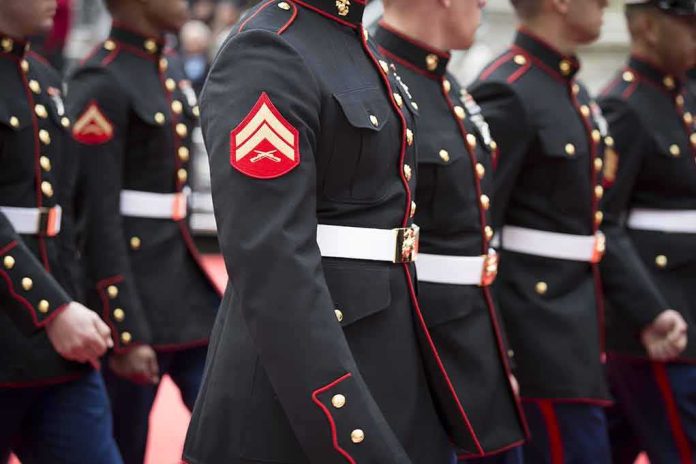
California’s state government overrode the U.S. Marine Corps and President Trump’s administration to shut down a major interstate for a military demonstration, sparking a dramatic showdown over national security, state authority, and the priorities of conservative leadership.
Story Highlights
- The Marine Corps planned to fire live artillery over Interstate 5 near Camp Pendleton as part of its 250th anniversary celebration, with Vice President JD Vance and Defense Secretary Pete Hegseth in attendance.
- California Governor Gavin Newsom, citing safety concerns, ordered a 17-mile, four-hour closure of I-5—overriding assurances from military leaders that the exercise was safe.
- The event highlights deepening tensions between federal and state authority, with conservative leaders emphasizing military readiness and liberal state officials prioritizing bureaucratic caution over national tradition.
- No injuries were reported, but the closure caused significant traffic disruptions and raised questions about the balance between public safety and the need to project American strength.
Federal-Military Vision Meets State Resistance
The U.S. Marine Corps, celebrating 250 years of service, sought to showcase its capabilities with a live-fire artillery demonstration over Interstate 5—a bold statement of American military prowess and a tribute to the sacrifices of generations of Marines. Vice President JD Vance and Defense Secretary Pete Hegseth attended the event, underscoring the Trump administration’s commitment to a strong, visible defense posture. Military leaders assured the public that rigorous safety protocols were in place and that no freeway closure was necessary, reflecting confidence in both their training and their respect for the communities they serve.
California’s state government, led by Governor Gavin Newsom, reacted with immediate skepticism. Newsom’s administration declared the exercise a public safety risk and, in a rare move, ordered the California Highway Patrol and Caltrans to close a critical 17-mile stretch of I-5 for four hours. This decision overrode federal and military assurances, forcing the Marines to conduct their demonstration over a closed, empty freeway. Newsom’s statement—“Firing live rounds over a busy highway isn’t just wrong — it’s dangerous”—framed the event as a reckless federal overreach, but conservative critics saw it as an overreaction by a state government hostile to both military tradition and presidential authority.
Political and Practical Implications
The confrontation between Camp Pendleton and Sacramento is more than a dispute over safety protocols—it is a microcosm of the broader clash between conservative federal priorities and progressive state governance. For conservatives, the event was an opportunity to celebrate American military strength and the Trump administration’s focus on rebuilding respect for the armed forces. The decision to close the freeway, however, reinforced a growing perception that California’s leadership is more interested in bureaucratic control and political posturing than in supporting the nation’s defenders or the practical realities of national security.
Economically, the closure disrupted one of the nation’s busiest trade corridors, impacting commuters, truckers, and local businesses. Socially, it stoked anxiety among residents and sparked debate over the appropriate balance between military exercises and civilian life. Politically, the incident has become a rallying point for conservatives frustrated with what they see as the erosion of federal authority and the prioritization of woke agendas over common-sense governance. The fact that no injuries or incidents occurred during the demonstration has led many to question whether the closure was truly necessary or simply a political statement.
Looking Ahead: Federalism Under Fire
This incident raises serious questions about the future of federal-state relations, especially in areas where military readiness intersects with civilian infrastructure. While the Marine Corps has a long history of training at Camp Pendleton, the decision to fire live artillery over a major freeway was unprecedented. The event’s aftermath may prompt a reevaluation of protocols for military demonstrations near public spaces, but it has also highlighted the need for clearer communication and cooperation between federal and state authorities.
For conservatives, the episode is a reminder of the importance of electing leaders who respect both the Constitution and the role of the military in American life. It also underscores the frustration many feel with state governments that appear more focused on resisting federal initiatives—whether on immigration, energy, or defense—than on finding practical solutions. As the nation grapples with these tensions, the Camp Pendleton artillery demonstration will likely be remembered as a symbol of the ongoing struggle to define the boundaries of authority in a divided America.
https://t.co/wmTK3UeKyh GAVIN, I AM SURPRISED AT YOU. YOU ARE NOT AFRAID OF MOUTHING OFF TO TRUMP, YET YOU MEEKLY SHUT DOWN SEVENTEEN MILES OF HIGHWAY FOR THE MILITARY?? YOU SCARED OF WHAT THE MILITARY COULD DO TO YOU??
— DAVIDSHELBY53 (@davidshelby53) October 19, 2025
Ultimately, the clash over I-5 is about more than traffic delays or artillery shells—it is about competing visions for America’s future. Conservatives see a federal government working to restore strength and tradition, while progressive state leaders prioritize caution and control. How these visions are reconciled will shape not only military policy, but the very fabric of American governance in the years to come.
Sources:
Plan to Fire Artillery Over California Highway During JD Vance Base Visit Irks Governor
Plan to fire artillery over California highway during JD Vance base visit draws state pushback







